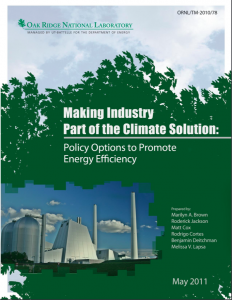Full Title: Making Industry Part of the Climate Solution: Policy Options to Promote Energy Efficiency
Author(s): Marilyn A. Brown, Roderick Jackson, Matt Cox, Rodrigo Cortes, Benjamin Deitchman, Melissa V. Lapsa
Publisher(s): Oak Ridge National Laboratory
Publication Date: May 1, 2011
Full Text: Download Resource
Description (excerpt):
Improving the energy efficiency of industry is essential for maintaining the viability of domestic manufacturing, especially in a world economy where production is shifting to low-cost, less regulated developing countries. Numerous studies have shown the potential for significant cost-effective energy-savings in U.S. industries, but the realization of this potential is hindered by regulatory, information, workforce, and financial obstacles. This report evaluates seven federal policy options aimed at improving the energy efficiency of industry, grounded in an understanding of industrial decision-making and the barriers to efficiency improvements. Detailed analysis employs the Georgia Institute of Technology‟s version of the National Energy Modeling System and spreadsheet calculations, generating a series of benefit/cost metrics spanning private and public costs and energy bill savings, as well as air pollution benefits and the social cost of carbon. Two of the policies would address regulatory hurdles (Output-Based Emissions Standards and a federal Energy Portfolio Standard with Combined Heat and Power); three would help to fill information gaps and workforce training needs (the Superior Energy Performance program, Implementation Support Services, and a Small Firm Energy Management program); and two would tackle financial barriers (Tax Lien Financing and Energy-Efficient Industrial Motor Rebates). The social benefit-cost ratios of these policies appear to be highly favorable based on a range of plausible assumptions. Each of the seven policy options has an appropriate federal role, broad applicability across industries, utilizes readily available technologies, and all are administratively feasible.
